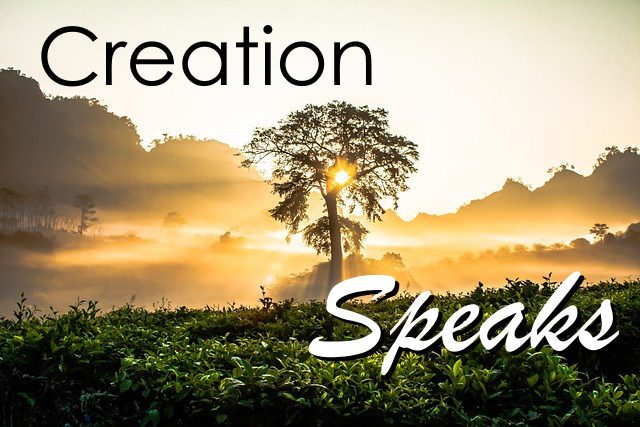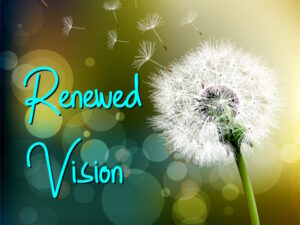A congregation of the United Church of Canada

Yr A ~ Creation 4 ~ Psalm 104
Psalms are poetry. They’re the ancient Jewish hymn book which naturally means that they were written in Hebrew. So, to get at it we have to translate a passage from an ancient and completely alien language to us, into understandable English. Translating word for word may offer one level of truth, but going thought-for-thought will probably come closer to the poetic meaning of the original. You’ll especially see this near the end of my message today.
Think about the subject matter of this liturgical season: Creation. We could approach it in prose like a text book and it would yield a certain level of truth. For instance, we can know that while the poetry in the Book of Genesis says the Heavens and the Earth were created in 6 days, we know it took billions of years. And we can know that life on Earth evolved from very simple to very complex organisms over millions of years, and understand scientifically how botany and biology work, but that prose can never communicate to us on the same level as a poem about a glorious sunrise. The bible has never been concerned about how Creation really happened—it’s only concerned with what it means, and so poetry is the perfect medium to convey that deeper truth. So let’s go! (Oh, and I’m going to switch to The Message translation, just for more colour.)
Psalm 104:1-2 O my soul, bless God! God, my God, how great you are! Beautifully, gloriously robed, dressed up in sunshine, and all heaven stretched out for your tent.
If you try to make that prose you ruin it. It’s pure poetry—dressed up in sunshine.
10-13 You started the springs and rivers, sent them flowing among the hills. 11 All the wild animals now drink their fill, wild donkeys quench their thirst. 12 Along the riverbanks the birds build nests, ravens make their voices heard. 13 You water the mountains from your heavenly cisterns; earth is supplied with plenty of water.
The poet is gushing. They’re overwhelmed by the enormity and wonder of Creation, and they’re being effusive in their description of it all. Don’t make the error of thinking because they address this poem to God and use the word “you” that they’re necessarily imagining some Big Guy in the Sky with a beard and a bag of tricks. Just because they’re ancient doesn’t mean they’re metaphorically primitive. It’s our modernist eyes that have stripped all the mystery out of things.
It could be that the poet is simply personifying the incomprehensible awesomeness of the world that surrounds us—that they sense that in, and through, and under, and around everything they see and experience is Something More, something Sacred, something light years beyond prose. And so they sing to the Sacred.
14-15 You make grass grow for the livestock, hay for the animals that plow the ground. Oh yes, God brings grain from the land, 15 wine to make people happy, Their faces glowing with health, a people well-fed and hearty.
Doesn’t it just make you feel like celebrating?!
[in a boring lecture voice] The Earth produces grains and grapes that humans have learned to use to create foods such as bread and wine which contribute to human nourishment and enjoyment resulting in their facial area changing hue as blood vessels expand creating the effect of a radiance that communicates happiness…[snore]
Prose just doesn’t cut it here.
Then we get to hear about some of the awesome diversity of creatures, and how we’re all so interdependent on one another.
16-23 God’s trees are well-watered – the Lebanon cedars God planted. Birds build their nests in those trees; look – the stork at home in the treetop. Mountain goats climb about the cliffs; badgers burrow among the rocks. The moon keeps track of the seasons, the sun is in charge of each day. When it’s dark and night takes over, all the forest creatures come out. The young lions roar for their prey, clamoring to God for their supper. When the sun comes up, they vanish, lazily stretched out in their dens. Meanwhile, men and women go out to work, busy at their jobs until evening.
Then one of my favourite expressions in this psalm:
24 What a wildly wonderful world, God!
Yes, indeed! What a wildly wonderful world! And we’re called to go into that wild—both literally and metaphorically. Literally we are part of the wild, part of the web of life that is delicately and intricately woven into the fabric of this planet. We are part of the chain. We are part of the eco-system. Although, we should understand our place with some humility, because there are those who think the wild could get along just fine without us!
And it also means that we’re called to go into the wild, metaphorically—to allow ourselves to be swept up in these poetic metaphors that open up deeper meanings and deeper appreciation and love for our good fortune to be able to enjoy the fruits of this breathtakingly diverse planet. I mean, just stop for a second and consider how amazing this world is. It’s wild! We can catalogue it scientifically, but there are deeper layers that we can connect with and feel deep down in our bones that we’re not just on the Earth we’re “in” it. We’re “of” it.
We perceive that deeper layer as special, as powerful, as awe-inspiring, as Sacred, as Mystery, and we name that powerful, awesome, Sacred Mystery, God. And we’re inspired to express it poetically.
24b You made it all, (O glorious Mystery), with Wisdom at your side, made earth overflow with your wonderful creations. 25 Oh, look – the deep, wide sea, brimming with fish past counting, sardines and sharks and salmon. 26 Ships plow those waters, and Leviathan, your pet dragon, romps in them.
Isn’t that fascinating. First you get an accounting of the awesome diversity of creatures and animals in the world. Then you get this really weird thing about God’s pet dragon!
I read that the idea of Leviathan (a stupendous, mythological sea creature) being God’s “pet” is actually the real connotation from the Hebrew words. If God had a dog, what would the dog look like? Like a giant sea creature, I guess! But it’s communicating that even the Creator shares in the joy and beauty of Creation—that God is not a distant clock-maker who set it into motion and monitors it from afar, but rather that God is interactive with Creation, and keeps a pet dragon in the sea for fun. (Remember, it’s a poem, it’s whimsical, it’s not a text book!)
Poems are meant to speak to us on a deep level. Can you hear it? Can you hear or perceive Creation speaking to you, communicating with you, communing with you? If we really are as interconnected with all of Creation as science says we are, we ought to be able to hear Creation speak to us! If you think Creation isn’t speaking – well, you’re just not listening carefully enough yet.
Then the psalm shifts its focus, and it explores the relationship between God and Creation.
27-28 All the creatures look expectantly to you to give them their meals on time. 28 You come, and they gather around; you open your hand and they eat from it.
That’s God as provider. Have you ever hand fed a small animal, like a chipmunk, or a little bird? It’s the same kind of image with God as provider. God’s open hand provides. Not food, directly, but love, blessing, breath! In this metaphor, YOU are the chipmunk, eating from the palm of God’s hand!
Now listen closely to this next bit. This is the payoff! We’re going to have to work with this one to get it. Remember I said that translating poetry into different words can sometimes ruin it. Here’s an example. So let’s try to get at the original poetry. None of us probably read Hebrew, but it might help to know that Hebrew doesn’t really form into sentences like English does—it’s more like it’s a collection of little word-images that you have to assemble together into a thought.
This part of the poem is written in a parallel structure. That means that each part of one verse has a direct correlation to another verse, and you can’t understand the first one until you finish the second one! They work together to build the meaning.
Here’s the NRSV translation:
29 When you hide your face, they are dismayed; when you take away their breath, they die and return to their dust. 30 When you send forth your spirit, they are created; and you renew the face of the ground.
Read improperly, it makes God sound like a capricious tyrant. We know that can’t be true, because we know God is love. So let’s look deeper.
Here are the Hebrew word-pictures in parallel:
The left column is verse 29, and the right column is verse 30… (read down first)
you-are-gathering you-are-sending-forth
spirit-of-them spirit-of-you
they-are-expiring they-are-being-created
and to soil-of-them and surfaces-of-ground
they-are-returning you-are-renewing
Can you see it? The left side is dying. The right side is rebirth. The left side is what it’s like when you can’t see the Sacred in all things. The right side is the abundant life that comes when you can. Dying and rising – ending and beginning – resurrection – it’s theologically baked-in to the whole bible.
It’s all about abundant life and rebirth and renewal – it’s about what happens when you learn to see God’s face hidden in all those things the text book catalogues. It’s about the deeper reality of recognizing the Sacred and the Mystery in all things – and letting them speak to you. If you read the bible literally instead of metaphorically you’re limiting God to black, grey and white in a billion colour world.
And what do we do when we recognize and become aware of that spiritual awesomeness, and spirit-filled inspiration, and spiritually warm interconnectedness of all things? What do we do?
Psalm 104:33-34 Oh, let me sing to God all my life long, sing hymns to my God as long as I live!
Oh, let my song please God; I’m so pleased to be singing to God.
That’s what we do! That’s what the psalmist did! That’s what all of creation does!
And then the psalm ends on a misunderstood note. It doesn’t mean what it sounds like it means. In fact, it’s so misunderstood that our lectionary actually leaves out this sentence, because it can be so misleading.
Psalm 104:35 (NRSV) Let sinners be consumed from the earth, and let the wicked be no more. Bless the Lord, O my soul. Praise the Lord!
Again, it’s a language problem. In Hebrew, the word translated as consumed here means to be completed, to come to an end. Not ‘destroyed’ (wiped out) but more like ‘no longer being a thing’. It’s like we might say “let poverty be consumed from the earth!” Or “let injustice be consumed from the earth!” (On ‘Orange Shirt Day’ that hits home!) It’s not a vengeful desire of the psalmist to eliminate bad people. We need to read it through the lens of love – because that’s God’s lens!
And, need I remind us that everyone falls short of God’s standard of loving-kindness, which means everyone, on some level, is a ‘sinner’? So, if all ‘sinners’ were destroyed there’d be no one left at all. So it must mean more than that. And it does! It’s more of a heartfelt plea for a better version of the world more in keeping with God’s vision of love. A plea to eliminate the things that distract us from perceiving God’s Spirit at all times.
But no matter how distracted we are, and how silent God’s voice seems to be – Creation is always speaking – Creation is always speaking. As is so often the case – the difference is whether or not we notice.
Amen!



